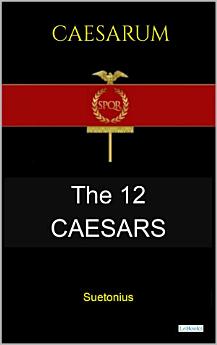THE TWELVE CAESARS - Suetonius
កុម្ភៈ 2024 · Lebooks Editora
សៀវភៅអេឡិចត្រូនិច
256
ទំព័រ
family_home
មានសិទ្ធិ
info
reportការវាយតម្លៃ និងមតិវាយតម្លៃមិនត្រូវបានផ្ទៀងផ្ទាត់ទេ ស្វែងយល់បន្ថែម
អំពីសៀវភៅអេឡិចត្រូនិកនេះ
Written by the great Roman historian Suetonius in the year 121, " The Twelve Caesars" is an extremely important historical document and one of the main sources of knowledge about Roman history. In this magnificent work, which covers the period from the rise to the fall of the Roman Empire, we get to know the intimacy of the life of each of the twelve Caesars: their ancestors, their military campaigns, the events that led them to power and death, as well as the character and personality of each of them. Beyond historical facts, Suetonius managed to portray the human character of the 12 Caesars in an environment characterized by unlimited power, violence, and the debauchery and luxury of the emperors in ancient Rome. It is an exceptional work that deserves to be read.
អំពីអ្នកនិពន្ធ
Caio Suetônio Tranquilo was born in Rome, presumably in the year 69 AD, and died around the year 141. Son of a tribune of the 13th Legion, he embraced both the military and literary careers. A contemporary and friend of Pliny, the latter wanted to introduce him to the career of public offices, which Suetonius modestly refused. He shone especially in the forum, having been one of the most eminent figures of the senatorial nobility. Appointed secretary ab epistolis during the time of Emperor Hadrian, he entered the intimacy of the court, where, however, he quickly fell out of favor for monopolizing the attentions of Empress Sabina. In his spare time from public duties, Suetonius dedicated himself to the study of history. A scholar of the customs of his people and his time, he wrote many scholarly works, in which he reviewed the main characters of the era. Above all, he was an indiscreet revealer of the intimacies of the Roman court, giving us an intimate and unceremonious view of the vices of the emperors and the petty quarrels that divided the nobility. His main works are: "De Ludis Grecorum" (On Greek Games); "De Spectaculis et Certaminibus Romanorum" (On Roman Spectacles and Contests); "De Anno Romano" (On the Roman Year); "De Nominibus Propiis et de Generibus Vestium" (On Proper Names and the Classes of Garments); "De Roma et ejus Institutis" (On Rome and Its Institutions); "Stemma Ilustrium Romanorum" (Stem of Illustrious Romans); "De Claris Rhetoribus" (On Famous Rhetoricians); and "A Vida dos Doze Césares" (The Lives of the Twelve Caesars). This is the only one that has survived to our days. Unfortunately, the others have been lost, which represented an incalculable historical loss, as we know they were valuable works for the study of classical antiquity, as the reader can observe from this precious work, "The Lives of the Twelve Caesars."
វាយតម្លៃសៀវភៅអេឡិចត្រូនិកនេះ
ប្រាប់យើងអំពីការយល់ឃើញរបស់អ្នក។
អានព័ត៌មាន
ទូរសព្ទឆ្លាតវៃ និងថេប្លេត
ដំឡើងកម្មវិធី Google Play Books សម្រាប់ Android និង iPad/iPhone ។ វាធ្វើសមកាលកម្មដោយស្វ័យប្រវត្តិជាមួយគណនីរបស់អ្នក និងអនុញ្ញាតឱ្យអ្នកអានពេលមានអ៊ីនធឺណិត ឬគ្មានអ៊ីនធឺណិតនៅគ្រប់ទីកន្លែង។
កុំព្យូទ័រយួរដៃ និងកុំព្យូទ័រ
អ្នកអាចស្ដាប់សៀវភៅជាសំឡេងដែលបានទិញនៅក្នុង Google Play ដោយប្រើកម្មវិធីរុករកតាមអ៊ីនធឺណិតក្នុងកុំព្យូទ័ររបស់អ្នក។
eReaders និងឧបករណ៍ផ្សេងទៀត
ដើម្បីអាននៅលើឧបករណ៍ e-ink ដូចជាឧបករណ៍អានសៀវភៅអេឡិចត្រូនិក Kobo អ្នកនឹងត្រូវទាញយកឯកសារ ហើយផ្ទេរវាទៅឧបករណ៍របស់អ្នក។ សូមអនុវត្តតាមការណែនាំលម្អិតរបស់មជ្ឈមណ្ឌលជំនួយ ដើម្បីផ្ទេរឯកសារទៅឧបករណ៍អានសៀវភៅអេឡិចត្រូនិកដែលស្គាល់។








